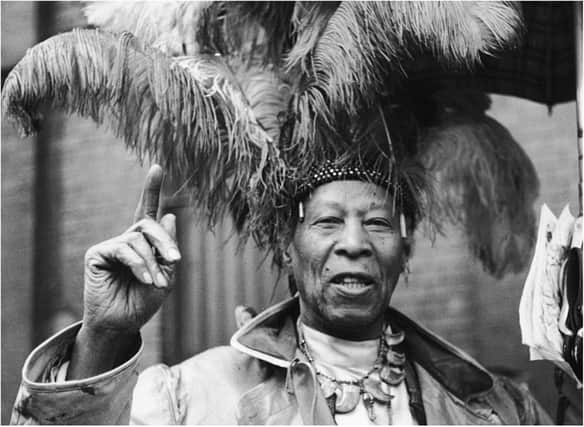True story of colurful Doncaster racing tipster revealed in new research


The unmistakable cry of Prince Monolulu, the original colourful, showman racing tipster and a familiar sight at Doncaster Racecourse for a number of decades up to his death in the 1960s.
Decked out in a plumed head-dress, garish pantaloons and waving around an umbrella. he would tour racecourses up and down the country passing on betting tips to eager punters telling them: “I gotta horse! I gotta horse to beat the favourite.”
Advertisement
Hide AdAdvertisement
Hide AdHis unique style made him one of the first black people to appear on British television and become a celebrity.
Now, after painstaking research, a retired policeman has pulled the pieces of Monolulu’s life together – and separating the truth from fiction has helped shape the story of his life and how he came to be such an unmistakable figure on the British racing scene.
He arrived in England at the turn of the 20th Century claiming to be from Ethiopia, and died in London in 1965, at the age of 84.
His fame was assured in 1920 when he tipped Spion Kop to win the Derby.
Advertisement
Hide AdAdvertisement
Hide Ad"I've gotta horse to beat the favourite, Spion Kop will win the Derby, put your shirt on it, put your pants on it. And when you win - roast beef, two veg, Yorkshire pudding, and God save the King,” he told punters.
The horse won at odds of 100-6 (about 16-1) netting Monolulu a reputed £8,000 (worth around £400,000 in today's money) – and eager for punters to listen to his words of wisdom.
Not that he gave his tips for free. Many thought they were placing bets, when in reality, they were simply paying Monolulu for a tip.
John Pearson, now 84, a former inspector recalled how, in his rookie days as a bobby on the beat in the 1950s, he bumped into a larger-than-life character in Buckinghamshire market town Chesham.
Advertisement
Hide AdAdvertisement
Hide Ad"I turned around and thought 'who on earth is that?' I got the shock of my life. I was looking straight into the eyes of what I thought was an African chief," he remembers.
Curious, he set about discovering more and his interest turned into a serious hobby after Monolulu's death and his own retirement.
"Eventually after a lot of research I managed to establish that he was originally from St Croix in the US Virgin Islands," he told the BBC.
"His beginnings were very humble, but he obviously had a very sharp mind and spoke several languages."
Advertisement
Hide AdAdvertisement
Hide AdBorn Peter Carl McKay in 1881, Monolulu arrived in Britain from the United States around 20 years later, seeking a better life, having earlier claimed to have been shipwrecked.
In London he joined the chorus line of In Dahomey, an all-black West End musical show, and appears to have developed his interest in racing after meeting an Irish tipster.
Away from the track, he could be found in the capital's markets such as East Street and Petticoat Lane, selling lucky mascots and even medicines that claimed to cure anything from flat feet to baldness.
He said: "There is some myth and legend. If he felt something was going down well, it probably got enhanced a bit. I think a lot of it is true.
Advertisement
Hide AdAdvertisement
Hide Ad"He says he was married six times, but I've only found evidence of three. His claim to be from Ethiopia was a load of rubbish, but it gave him the chance to dress up as someone who would be recognised.
"A black man here in those days had to work twice as hard to make his presence felt in society and Monolulu somehow got right on top of it all."
Even Monolulu's death is wrapped up in legend - and no one seems to know the truth and Pearson is still piecing together the puzzle.
"I cannot believe that after so many years I'm still finding out bits and pieces. Things come in from all over the world," he says.
Advertisement
Hide AdAdvertisement
Hide AdHe died on Valentine's Day, 1965. Legend says he choked in hospital on a chocolate given to him by journalist Jeffrey Bernard.
A strawberry cream, it's said, from a box of Black Magic.
It seems the true story will never be known, with Bernard taking the story to the grave with him following his own death in 1997.